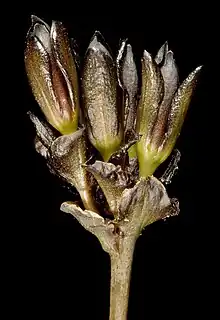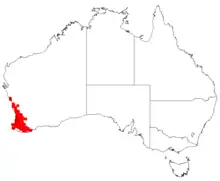| Haemodorum simplex | |
|---|---|
 | |
| Scientific classification | |
| Kingdom: | Plantae |
| Clade: | Tracheophytes |
| Clade: | Angiosperms |
| Clade: | Monocots |
| Clade: | Commelinids |
| Order: | Commelinales |
| Family: | Haemodoraceae |
| Genus: | Haemodorum |
| Species: | H. simplex |
| Binomial name | |
| Haemodorum simplex | |
 | |
| Occurrence data from the Australasian Virtual Herbarium | |
Haemodorum simplex is a plant in the Haemodoraceae (blood root) family, native to the south west of Western Australia,[1] and was first described by John Lindley in 1840.[2][3]
It is a perennial herb, growing from 0.2-0.65 m high, on clayey and sandy loams, and sands, at swampy sites.[2]
References
- ↑ "Haemodorum simplex Lindl. | Plants of the World Online | Kew Science". Plants of the World Online. Retrieved 22 January 2023.
- 1 2 Grazyna Paczkowska (22 June 1994). "Haemodorum simplex Lindl". FloraBase - The Western Australian Flora. Western Australian Herbarium. Retrieved 22 January 2023.
- ↑ John Lindley (1839), A sketch of the vegetation of the Swan River Colony, pp. xliv, Wikidata Q2819904
This article is issued from Wikipedia. The text is licensed under Creative Commons - Attribution - Sharealike. Additional terms may apply for the media files.